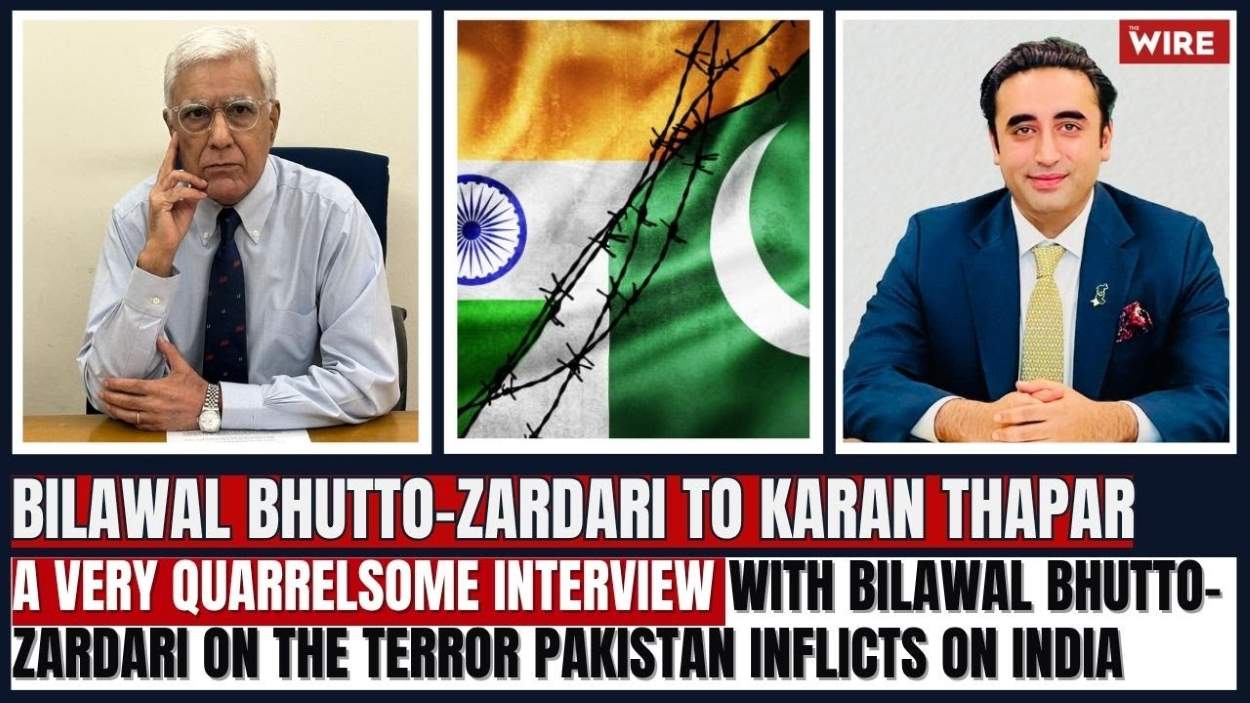Pakistan Peoples Party (PPP) Chairman Bilawal Bhutto Zardari, in a candid interview with Indian journalist Karan Thapar on July 9, 2025, urged the Indian public to resist disinformation and hate-mongering amid escalating tensions.
The former foreign minister firmly denied Pakistan’s involvement in cross-border terrorism, describing such accusations as propaganda. This exclusive conversation, the first by a Pakistani politician with Indian media since recent conflicts, highlighted shared challenges like terrorism and the need for dialogue.
Bilawal emphasised that it is easy for the current generation to advocate war based on false narratives. He stated that not every Pakistani is a terrorist or enemy, countering what he called a disinformation campaign. Pakistan does not permit terrorist groups to operate inside or outside its borders, he asserted, noting the country’s heavy toll from terrorism. Over the past decades, Pakistan has lost 92,000 lives, with more than 1,200 civilians killed in over 200 attacks last year alone. If the current pace continues, 2025 could be the bloodiest year in Pakistan’s history, he warned. As a personal victim having lost his mother, Benazir Bhutto, to terrorism, Bilawal expressed deep empathy for families affected by attacks like the April 22, 2025, Pahalgam incident in Indian Illegally Occupied Jammu and Kashmir (IIOJK), where 26 tourists died.
I agreed to be part of this conversation because I believe it's important to talk to you to talk to the people of India and chart a way forward. I'm not from the same generation as you are, and I don't want to see my generation that actually forms a majority of the populations on… pic.twitter.com/W2sed6J8bq
— PPP (@MediaCellPPP) July 9, 2025The interview, described by Thapar as “very quarrelsome” due to frequent interruptions and heated exchanges, saw Bilawal challenge India’s claims over the Pahalgam attack, which led to a four-day military escalation from May 7 to 10. He accused New Delhi of lying to its public about Pakistan’s role, pointing out the lack of shared evidence with Pakistan or the international community.
Bilawal Calls for Joint Probe
Bilawal outlined Pakistan’s actions against terrorism, including military operations in South and North Waziristan and the implementation of a National Action Plan targeting groups of concern to India. He highlighted the rigorous Financial Action Task Force (FATF) process, which Pakistan completed with international endorsement, as evidence of its commitment to combating money laundering. The process includes monitoring mechanisms that cannot be evaded, he explained.
Immediately after India’s accusations following the Pahalgam attack, Pakistan’s Prime Minister Shehbaz Sharif offered to join an impartial international inquiry, asserting Pakistan’s clean hands. India rejected this proposal, Bilawal noted. He advocated for comprehensive dialogue between the two nations, including on terrorism, to combat the menace collectively.
To underscore double standards, Bilawal referenced the 2007 Samjhota Express bombing, where dozens of Pakistanis died on Indian soil with no convictions to date. He also mentioned “saffron terror” and cases like Indian spy Kulbhushan Jadhav, arrested in Balochistan, and links between recent attacks in Pakistan and Indian intelligence.
Bilawal criticised India’s threats to withhold water supplies under the Indus Waters Treaty, calling it a violation of humanitarian principles and contrary to India’s secular ethos and Gandhian philosophy. Such actions threaten 240 million Pakistanis and escalate tensions unnecessarily, he argued.
Despite challenges, including Pakistan’s retaliatory Operation Bunyan-um-Marsoos in response to Indian aggression, Bilawal reiterated a desire for peace. Pakistan wants to resolve all issues through talks, he concluded.
Read: Trump Signals Trade Talks with Pakistan, India Amid Tariff Tensions
In a post-interview tweet, Bilawal explained his decision to engage Indian media, expressing faith in India’s youth and a shared mission for peace. He promised that the new generation would overcome historical conflicts, focusing on challenges like terrorism, climate change, and inequality through cooperation and prosperity.
The interview sparked varied responses. Pakistani commentators praised Bilawal’s composure and diplomatic skill, viewing it as a masterclass in statesmanship. Indian reactions, including from journalist Karan Thapar, highlighted its contentious nature, with some criticising the approach as undermining dialogue. Others saw Thapar’s assertiveness as a defence of national sovereignty.






